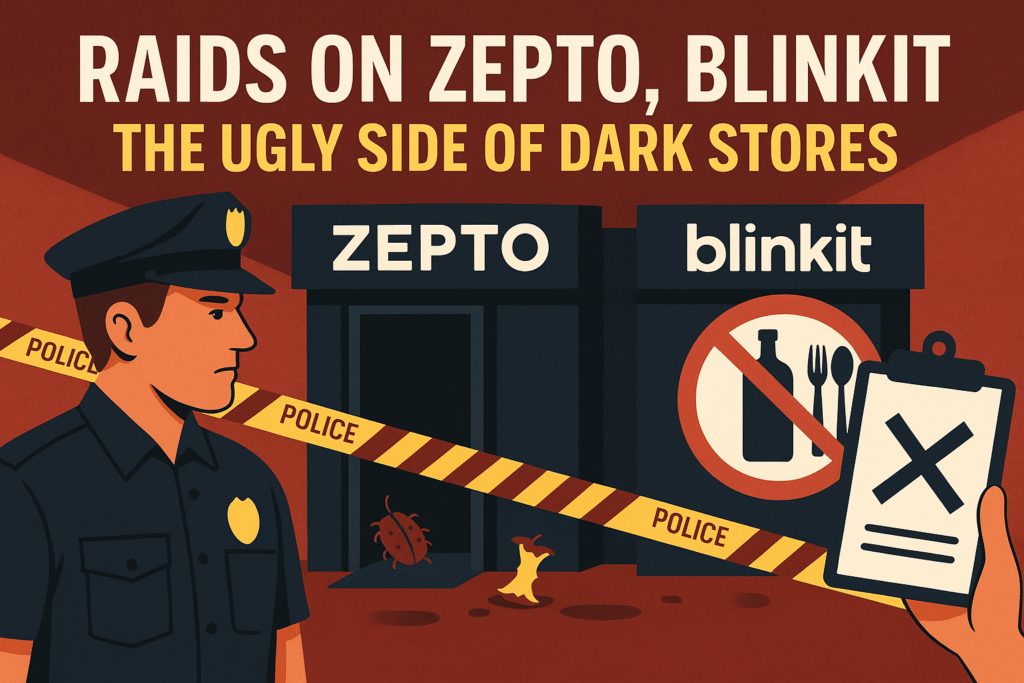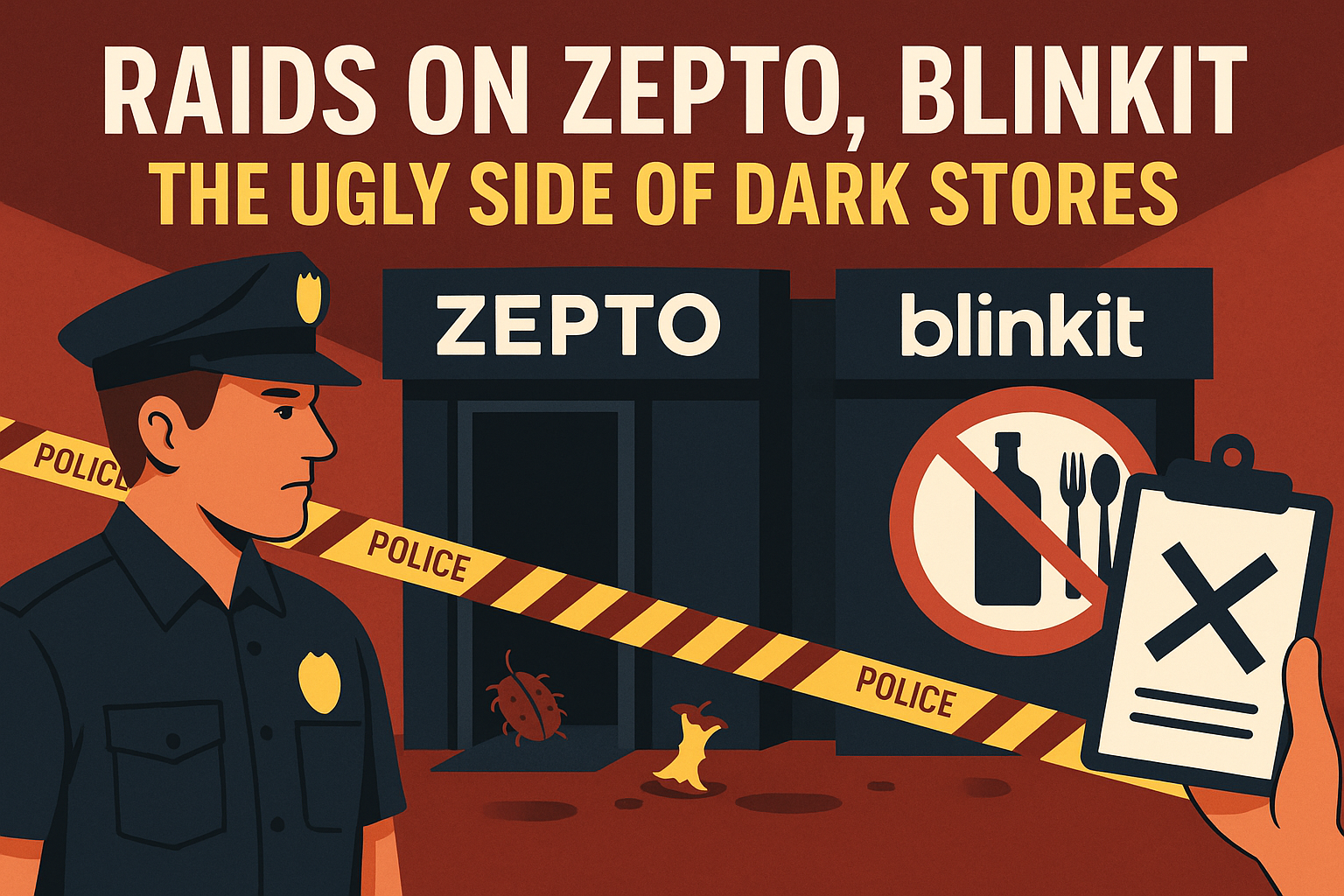Raids on Zepto: Dark Stores Under Fire in India’s Quick Commerce Boom
Introduction: The Cracks in the 10-Minute Delivery Dream
The quick commerce revolution in India, built on the promise of 10-minute deliveries, is beginning to show signs of strain. The recent raids on Zepto and Blinkit have turned the spotlight on the darker side of this high-speed delivery model. These raids, especially those conducted by the Food and Drug Administration (FDA) in Maharashtra, have revealed a disturbing lack of compliance with food safety and hygiene regulations in the so-called “dark stores” — the hidden backbone of quick commerce platforms.
The Trigger: What Happened During the Raids on Zepto?
Earlier this week, the FDA suspended the food business licence of a Blinkit dark store in Pune’s Balewadi area. Days before that, raids on Zepto’s Mumbai dark store also made headlines. Although Zepto’s suspension was later revoked, the events raised red flags about operations inside these storage and quick cafe kitchens.
According to officials, the raids on Zepto uncovered fungal growth on food items, improperly maintained cold storage, stagnant water around edible inventory, and expired goods. A total of 11 types of food products were destroyed during the inspection. The scene was no different in Telangana last year, where Blinkit’s warehouse was labelled “disorganised and unhygienic.”
Dark Stores: A Quick Look Inside
Dark stores are non-customer-facing storage units used to fulfill online orders rapidly. Operated under models like COCO (Company Owned, Company Operated), COFO (Company Owned, Franchise Operated), and FOFO (Franchise Owned, Franchise Operated), these stores stock various perishable and non-perishable items.
The raids on Zepto revealed glaring gaps in the Standard Operating Procedures (SOPs), especially around cold storage. Industry insiders note that around 90% of dark store inventory is dry goods, with only 10% cold-stored. This imbalance, combined with a fast-selling cycle of 24–48 hours, results in products nearing expiry — or already expired — being sent to stores.
Legal Framework and Obligations
The Food Safety and Standards (Licensing and Registration of Food Businesses) Regulations, 2011, clearly outline the responsibilities of food businesses. These include maintaining hygiene, monitoring expiration dates, ensuring cold storage, and keeping food away from contaminants. The raids on Zepto highlighted non-compliance in many of these areas.
When violations are found, officials typically issue an improvement notice. If issues aren’t resolved within a stipulated period, licenses can be suspended or canceled. The recent raids on Zepto and Blinkit suggest that these measures may not be enforced stringently enough.
Quick Commerce Growth vs. Safety Concerns
India’s quick commerce sector is expected to reach $40 billion by 2030. Zepto, Blinkit, and Instamart are racing to dominate the space with more than 1000 dark stores each. Zepto alone is operating nearly 1140 such units, though it’s currently moderating expansion amid IPO preparations.
Despite the aggressive growth, the raids on Zepto show that many platforms are sacrificing due diligence in their rush to scale. Reddit posts and customer complaints have surfaced, describing instances of stale or rotten food being delivered.
One Redditor shared, “I ordered chicken from Swiggy’s Instamart. It smelled rotten even after cooking. Clearly, it wasn’t stored properly.”
Dark Store Loopholes
According to cold storage experts, every dark store should be equipped with IoT devices to monitor storage temperatures. Fruits, vegetables, and meat need to be stored at specific temperatures — usually 4 to 6 degrees Celsius. However, the raids on Zepto showed that such standards are often ignored.
“There are three categories — expired, near expiry, and long shelf. Quick commerce companies even dispatch near expiry items due to their 24–48 hour selling cycle,” said a cold storage entrepreneur.
The raids on Zepto also exposed improper stockpiling practices, with insufficient attention to expiry tracking or packaging integrity. Even though SOPs exist, their execution often depends on untrained franchise staff.
The Real Impact of Raids on Zepto
The raids on Zepto have done more than suspend a license or destroy expired products. They’ve cast a spotlight on systemic issues that could jeopardize consumer health and erode public trust. Platforms like Zepto must realize that a damaged reputation can be far more costly than delayed delivery.
Quick commerce is inherently demanding, but quality control and regulatory compliance should never take a backseat. If food safety protocols continue to be overlooked, further raids on Zepto and its peers are inevitable.
What Needs to Change?
- Mandatory IoT Monitoring: All dark stores should adopt IoT-based temperature monitoring systems.
- Regular Government Audits: Surprise inspections must be made routine, not rare.
- Training Programs: Franchise and store staff must undergo certified training in food safety and cold storage handling.
- Transparency: Platforms like Zepto should publish food safety audits and storage practices for public viewing.
- Enforcement of Improvement Notices: Authorities must ensure strict timelines and follow-ups on issued notices.
Conclusion: Responsible Growth is Key
The raids on Zepto have underlined a critical truth — that the 10-minute delivery model cannot come at the cost of consumer safety. As this segment matures, operational transparency, hygiene, and safety should be prioritized over speed. The quick commerce giants must take accountability and lead by example, making food safety a cornerstone of their expansion plans.
In a market headed towards a $40 billion valuation, there’s ample room for innovation — but none for negligence. The raids on Zepto are not just an isolated incident; they are a wake-up call for an industry at the crossroads of convenience and care.

